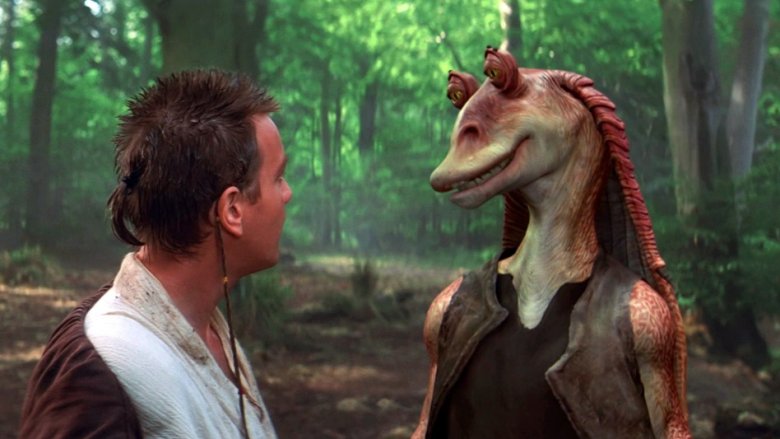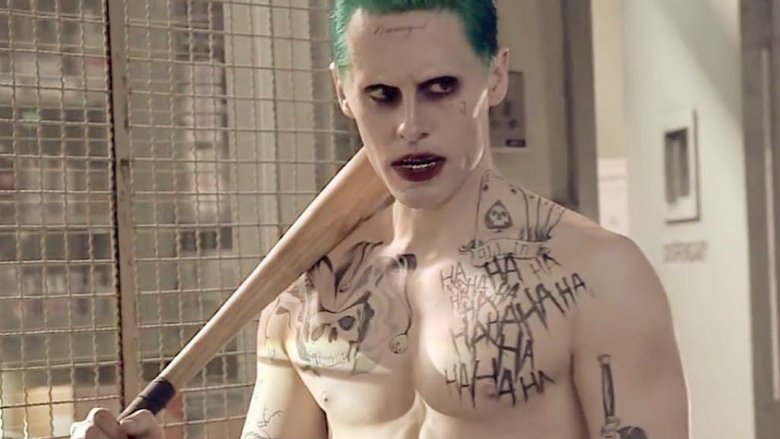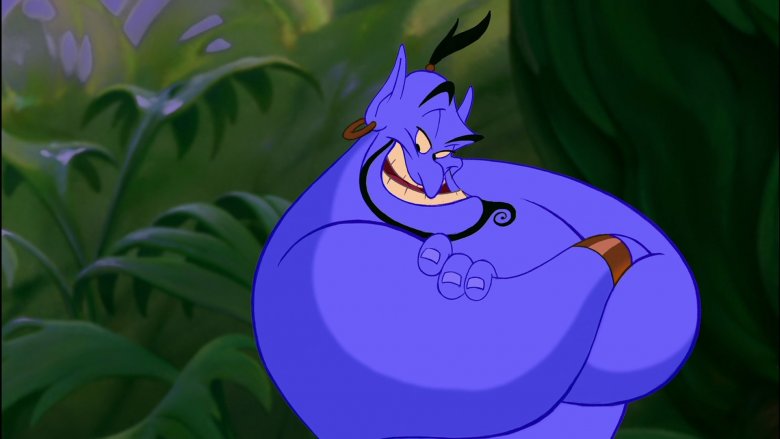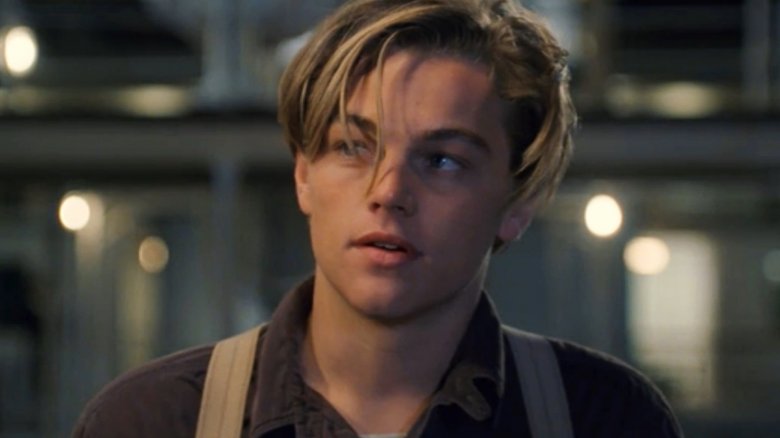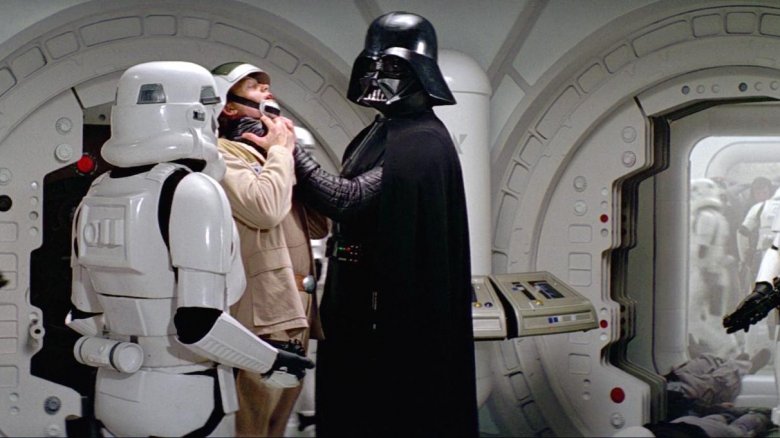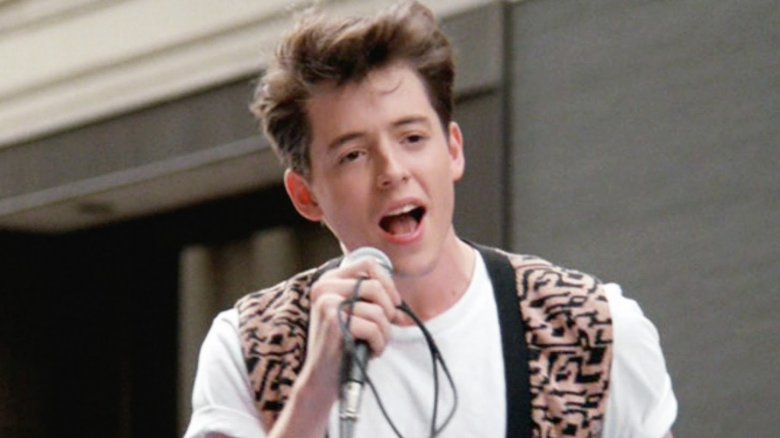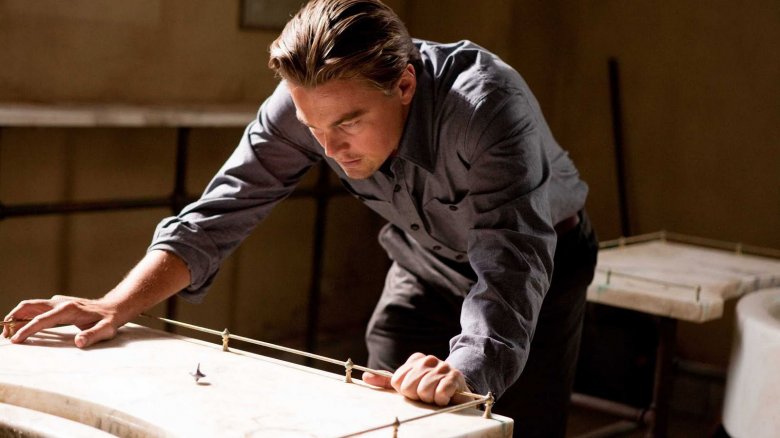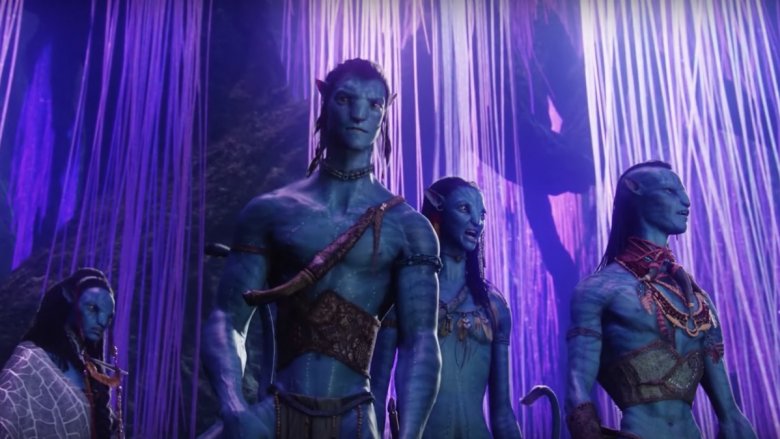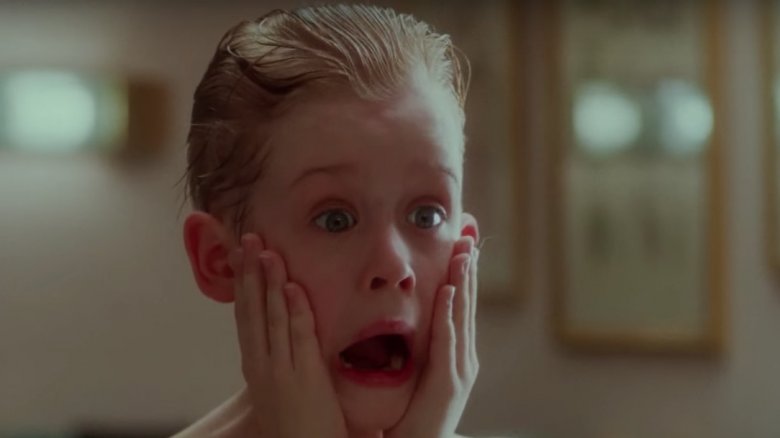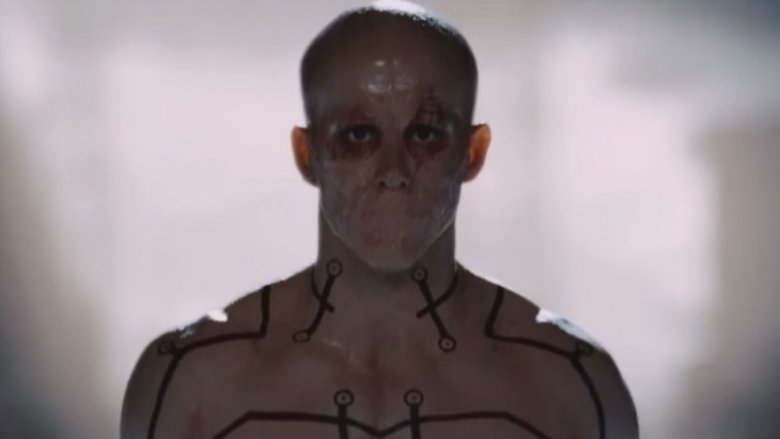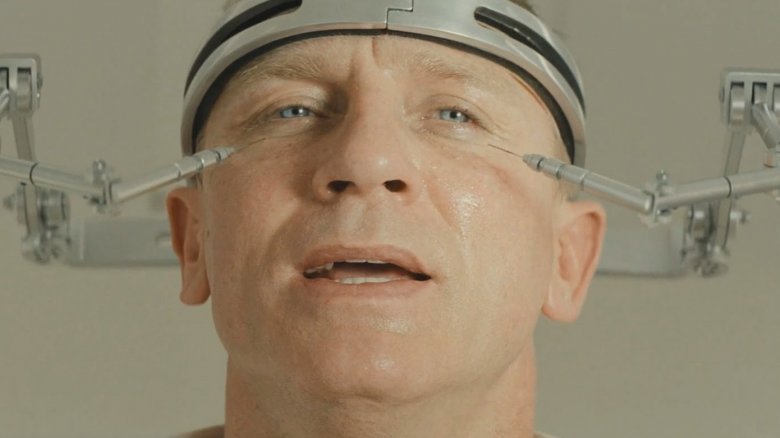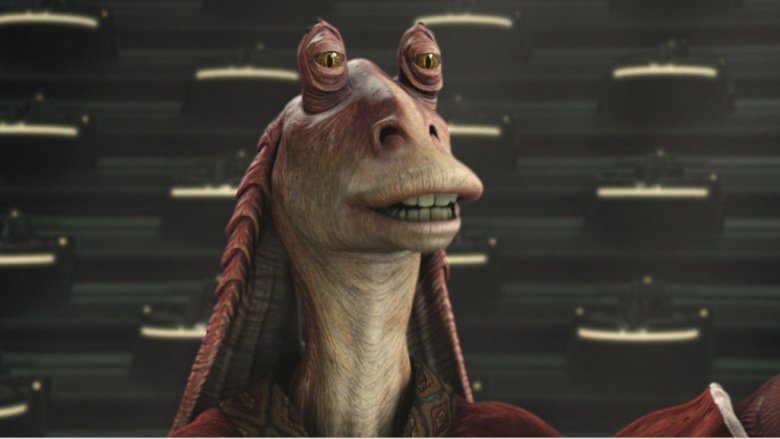Movie Fan Theories So Bad They're Good
From intriguing possibilities like the MacGuffin briefcase in Pulp Fiction containing Marsellus Wallace's soul to outrageous connections like The Pixar Theory, fan theories can be a fun way of seeing your favorite movies in a new light — and whether they're actually true is less important than whether thinking about them makes the stories better or more interesting to you as a viewer.
Even so, while you may have a personal favorite fan theory that you've adopted as part of the canon, there are many more outrageous examples that can sometimes feel as if the theorist was watching an entirely different movie. In fact, on occasion, fans can put so much effort into justifying an onscreen joke or character recasting that they end up almost inventing entirely separate movies in the process. From a romantic time traveler in Titanic to post-apocalyptic Disney movies, here are movie fan theories so bad they're good.
Laughing boy
Maybe it's mostly because the DCEU kicked off its second movie with a crossover, but there have been some pretty outlandish theories about the evolving shape of the franchise. When promotional photos and trailers for Suicide Squad were released, fans were shocked to see a Joker that looked very different from previous versions.
Speculation arose that the Joker's new look wasn't just a new design, but rather an elaborate clue that this wasn't actually the original Joker at all — he was a former Robin, Jason Todd. One fan on Reddit laid out a comprehensive breakdown of all the visual "clues" they could see in the Joker's tattoos, along with references to the Batman video games/cartoons that would seem to support this theory.
It's an intriguing idea, but this is one fan theory that has been almost entirely disproved. There's nothing in Suicide Squad to support it; instead, Joker's brand new look was actually just... his brand new look. Considering how critically reviled the film ended up being, maybe Jason Todd as the Joker would have been a better story.
Post-apocalyptic Aladdin
Disney's Aladdin is a classic, even when held up against the studio's sizable roster of other animated favorites. One big factor in the movie's success is Robin Williams' performance as the irascible Genie, whose constant pop culture references and rapid-fire jokes provide many of the film's funniest moments.
Still, some attentive viewers were bothered by some of Genie's dialogue — specifically era-inappropriate knowledge that ran the gamut from impersonating 20th century celebrities to his familiarity with technology like slot machines and cars. These fans have argued that Genie actually knows about the 20th century because Aladdin takes place in the future. Proponents of the theory argue that the desert surrounding Agrabah is barren because of nuclear radiation, and say that in the distant future, the world has actually become much more similar to the past. Still, as fun as it can be to imagine Aladdin and Genie in some Mad Max-esque world, that's a lot of work spent trying to justify why a character played by Robin Williams would utilize Williams' improvisational gifts.
The Terminator: Titanic Chronicles
You might know Titanic as a record-breaking romance, but did you also know that it's a secret science-fiction tie-in to director James Cameron's earlier hit The Terminator? Well, sort of. According to one fan, discrepancies in Jack's dialogue point to his understanding of future events. Jack references the Santa Monica Pier and Lake Wissota, both man-made structures that wouldn't be built until 1917 and 1916, respectively — years after the film's 1912 setting. In addition, the fan argues that Leo's floppy locks weren't just an aesthetic choice, but proof that Jack comes from a different era.
Supposedly, the reason for all this is that Rose is too important to die, and Jack's time-traveling role is to save her. Why? Well, because she's Sarah Connor's grandmother, connecting the historical event of the Titanic's sinking to The Terminator franchise. It's either that or the screenwriters didn't put in enough research to know what was period-appropriate to reference and messed up their dates. One of those answers is much more fun, though.
Missing stormtroopers
While there wouldn't be much of a Star Wars franchise if Luke Skywalker had been shot the first time he ran into a random stormtrooper, that hasn't stopped fans from concocting elaborate theories to justify the Empire's seemingly incompetent henchmen. One Reddit user argues that the reason the stormtroopers can't ever seem to hit any of the main characters is that they're actually missing on purpose to drive them into a trap devised by Darth Vader.
The crux of this argument points to the fact that the Empire was able to conquer the galaxy using stormtroopers, yet they still can't manage to take out a small crew of rebels, and argues that Darth Vader secretly gave the order not to harm any of the main characters in the original trilogy. At a glance, this sort of makes sense. Once Vader finds out Luke is his son, it isn't unreasonable to think that he'd want to do what he could to ensure his safety. If you're wondering why the stormtroopers didn't kill the rebels on Endor in Return of the Jedi, an event that happens after Darth Vader reveals his trap, well... maybe they didn't get the memo.
Ferris Bueller's Day (as an imaginary friend)
Arguably one of the most well-known fan theories about a movie ever, the Ferris Bueller "Fight Club" theory argues that Ferris is actually a figment of his best friend Cameron's imagination. Instead of a movie about three friends playing hooky in Chicago, it's actually about a depressed kid making up a friend that can give him the courage to stand up to his overbearing father. Ferris' girlfriend Sloane isn't real either — just an idealized representation of a girl Cameron has a crush on.
Despite the popularity of the theory, it's a frankly insane misrepresentation of the movie. Both the beginning and the end of the film are focused on Ferris, and the fear of getting discovered by Principal Rooney and Ferris' dad both revolve around those two characters and their relationship to Ferris, not Cameron.
Still, it's not hard to see why the theory caught on; Cameron is the character that has the most concrete arc, transforming from a depressed sad sack into someone emotionally stable enough to confront his father — well, assuming you don't count Ferris' sister, who learns not to be jealous of her brother after making out with Charlie Sheen in a police station.
Can you top this?
Christopher Nolan's dreamy heist film Inception invites no shortage of interpretations, particularly the ambiguous final shot. Is Cobb still dreaming or has he found his way back to the waking world? Is the whole thing a pseudo-autobiographical text about what it means to make a film? Seriously, was he dreaming or not?
Fans have been obsessed with that question since the film's release. The divisiveness of the final shot usually comes down to whether Cobb's totem, a spinning top, is wobbling (which would mean that he's awake) or spinning eternally (which would make it a dream). One fan argues that Cobb's totem isn't actually the top at all, but rather his wedding ring. The argument hinges on the fact that the top originally belonged to Cobb's wife. While it makes sense that he would have his own unique totem prior to his wife's death, it doesn't really follow that Cobb would be so stringent about not letting anyone else touch the top if he wasn't actually using it as a totem. Still, it's convincing enough that you're probably going to end up watching Inception again just to check, right?
Jake Sully, brainwashed Avatar
Chances are if you remember James Cameron's Avatar, you mostly remember the striking imagery and creature designs of the alien planet. As for the plot, well, we won't be the first to point out the similarities it shares with Dances with Wolves. As with the latter film, Avatar sees a soldier find love and acceptance in a different culture, ultimately giving up his former life. It's a happy ending that sees nearly the entire planet of Pandora rallying behind the native Na'vi to expel the invaders.
However, one fan has a decidedly darker take on the story, arguing that Pandora is actually a giant neural network that brainwashes Sully into becoming one of its protectors. It basically destroys the entire stated text of the movie; instead of having his prior misconceptions wiped away by the fundamental beauty of the natural world, the theory turns Sully into a brainwashed dupe working for a mysterious alien power. It's got nothing in common with Cameron's stated goals for the movie, but it is oddly convincing after you see the Na'vi tame wild animals with their strange mind tentacles.
Home Alone: a Saw prequel
Some of the most popular fan theories connect largely unrelated properties as unofficial crossovers. Fans can use an actor's appearance in multiple movies to imagine huge interconnected timelines or just point to shared themes and content as proof of the interconnectivity. For example, Jason Concepcion at Grantland put forth the theory that Kevin McAllister, the precocious hero of Home Alone, grows up to be the trap-obsessed serial killer Jigsaw in the Saw movies.
While it seems ludicrous to connect a wholesome family Christmas movie with a franchise that delights in sadistic violence, it's strangely compelling. The two characters do share a fondness for Rube Goldberg-style traps and a predilection for video tapes. For as gruesome as the traps become in the Saw movies, they really aren't much of an escalation from the surprisingly brutal trauma that Kevin deals out to the Wet Bandits in Home Alone. If nothing else, it gives you an excuse to watch one of the best Christmas movies ever made again.
X-Men Origins: purposely bad
As painful as it can be to see your favorite character in a bad movie, there's very little you can do other than hope for a better adaptation next time. X-Men Origins: Wolverine was destroyed critically and became so reviled among the fanbase that the film's existence was turned into a running joke in the Deadpool franchise. One fan on Reddit posited a theory arguing that the film's failings were purposeful, arguing that X-Men Origins: Wolverine is actually in-universe propaganda to encourage people to hate mutants.
The reason the film ignores so much previous X-Men continuity and uses bizarre storytelling choices is because the film is actually meant to be bad, showing the public at large (within the X-Men universe) that mutants aren't cool. Seen through that lens, Origins almost seems like a modern-day Reefer Madness, an uncool propaganda film that wears its politics on its sleeve. Plus, the theory gives viewers something else to blame for that ridiculous ending fight with a mute Deadpool.
James Bored
By far the most popular type of fan theory is the one that argues that the entire story took place entirely within someone's imagination. Maybe the St. Elsewhere finale twist lodged this style of fan theory so completely in the pop culture conversation; regardless of the origin, you can find theories saying that everything from Breaking Bad to Sex and the City took place in one character's fevered mind.
This brings us to the ending of 2015's Spectre, which caused one fan to argue that the happy ending — and James Bond's victory over Blofeld — was all a dream. The key points of this theory revolve around the dream-like pacing of the film's climax, and moments when Bond is saved from danger seemingly at random. Bond is so easily able to beat the villains after escaping Blofeld's trap because he never actually did escape. Instead, he's just imagining a victory completely devoid of tension. Maybe that explains why a record-breaking explosion is regarded with a bored stare from our favorite secret agent.
The true phantom menace
Ridiculous fan theories don't get much better than the notion that Jar Jar Binks is a secret Sith lord and the titular menace in Star Wars: The Phantom Menace. One fan laid out an extremely comprehensive list of all the ways in which Jar Jar's presence in the prequel trilogy leads to Palpatine seizing power and becoming the Emperor. The theory includes everything from Jar Jar's movements matching established Jedi powers as well as moments when he seems to use Jedi mind tricks to better his social stature.
The theory even references an interview with George Lucas discussing how important it was that Yoda was underestimated by first-time viewers only to find their preconceptions turned on their heads once they discovered he was a Jedi master. According to the theorist, Lucas was planning a similar reveal for Jar Jar until fan vitriol caused him to reconsider. The theory even justifies the title of the first film, explaining what exactly "the phantom menace" refers to: an underestimated Gungan who manages to conquer an entire galaxy so subtly that even the viewers didn't notice. Well, we're convinced.
